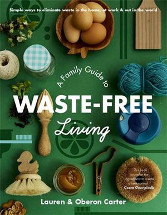A family guide to waste free living by Lauren & Oberon Carter

Pan Macmillan Australia, 2019. ISBN: 9781760783051.
The family at the heart of this book live in Tasmania and are part
of the Zero Waste movement, encouraging people to adopt the waste
hierarchy "Refuse, Reduce, Reuse, Rot, and Recycle. Many of us feel
good about the amount of waste we put in our recycling bins but that
waste collection uses a lot of fuel and resources and the ABC
programme "War on Waste" has demonstrated that the material
collected is not adequately recycled. By being mindful of what we
bring into our lives it is possible to dramatically limit what we
throw away. The authors suggest a starting point is to audit your
waste, tipping out your bins and recording what you have thrown out
in one week. By having a family conference to discuss the findings
it is possible to involve the children. Much of the book is taken up
with practical suggestions for waste free food, packaging, household
products, celebrations and taking the challenge for change to your
community. The section on children and babies looks at alternatives
to disposable nappies and wipes and to children's parties without
throwaway items. The pet food recipes shine a light on the source of
much of the packaging waste in households with pets. This family
approach to changing consumer habits is beautifully produced
featuring images of many reusable items that can be sourced from the
Zero Waste website. Sometimes the missionary zeal of the authors
comes across as selling a lifestyle, embracing permaculture and
organic food not just waste reduction. There is one page of
references to support many assertions through the text. I was
interested in the reference to toxoplasmosis on page 207 and found
the information was based on a 2010 article in Scientific American
entitled "Cat disease threatens endangered monk seals." p314. I was
also disappointed in the section exhorting men to step up to waste
free living, citing the stereotype "Boys are often raised to be
'tough' and indifferent to nurturing and domestic activities, while
girls are more often encouraged to cook and clean through their play
and in domestic life" p 302. Overall I would recommend the guide to
those seeking ways to make changes in their lives. Being about an
Australian family makes it relevant and the book's good design makes
the information readily accessible.
Sue Speck